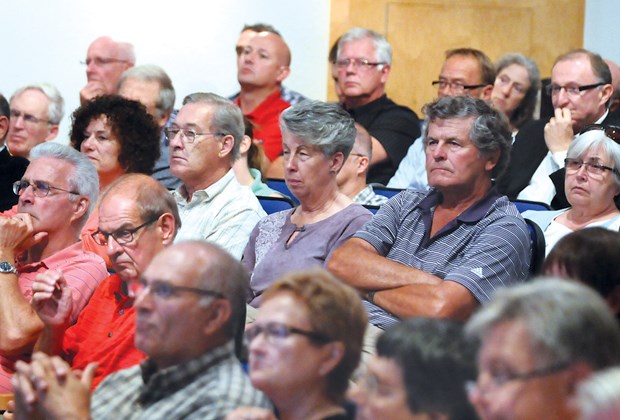There were cheers, jeers and a lot of applause echoing throughout the District of North Vancouver's council chamber Thursday night.
The district hosted a public meeting on the proposed Trans Mountain pipeline expansion by Kinder Morgan, with Mayor Richard Walton mediating. The public was free to ask questions to any of the panel speakers that included representatives from Kinder Morgan, the Georgia Strait Alliance, Tsleil-Waututh Nation and Port Metro Vancouver.
MLAs Ralph Sultan, West Vancouver-Capilano, and Jane Thornthwaite, North Vancouver-Seymour, were also in attendance though neither took part in the discussions.
"Our goal tonight is to provide you with information from a variety of perspectives so you can be better informed on this issue," said Walton, addressing an overflowing room.
Each panelist had 10 minutes to present, and were subsequently quizzed by district councillors. Members of the public had one minute to ask a question and the panelists had two minutes to respond.
Michael Davies, senior director of marine development at Kinder Morgan said it was heartening to see everyone taking time to get involved in the discussion. Davies said Kinder Morgan would apply to the National Energy Board for the pipeline expansion in December of this year. "Our application is primarily about the pipeline itself, but part of what we need to describe in the interview process is the effects of the project on the environment, and in this case that includes the increased tanker traffic," said Davies.
The proposed pipeline would twin the existing one that runs from outside of Edmonton to the Westridge Marine Terminal in Burnaby. Capacity would increase from 300,000 barrels per day to 890,000 barrels per day and tanker traffic would jump from an average of five per month to around 34 per month.
Davies said the application would look at the probability of risks and consequences should a spill occur today and observe how that would change with the project's approval.
"In Westridge today we have a single berth space, and we would propose to expand that to have three working berth spaces," said Davies. "Today we're about three per cent of the total traffic in the port and if the project was approved the tanker traffic would be about 14 per cent of the total traffic."
The company is not asking to dredge or change the nature of the ships, Davies said.
Duncan Wilson, vicepresident of corporate social responsibility at Port Metro Vancouver said the port would also be involved with the project application through their environmental, planning and operational teams. "It's going to be a harmonized process where the National Energy Board is going to lead the overall review and Port Metro Vancouver will contribute into that review," said Wilson.
Port Metro has had a very good safety record, he said.
"Its important to keep in mind that while there have been incidents, in 100 years of moving petroleum products through the port there's actually never been a navigational incident with a tanker or with a ship carrying a petroleum product," said Wilson. "And in 50 years of the modern crude tankers coming through Burrard Inlet carrying the product from this terminal, there hasn't been an incident either."
But not everyone was as convinced that the increase in tanker traffic would have little impact. Alexandra Woodsworth, energy and shipping campaigner for the Georgia Strait Alliance said the risks from the project definitely outweighed the benefits. "We're looking at a region that's at a moment where we could transition from being a place that is spectacular, that is proud to be a green paradise, (to) looking at a place that is turning into a corridor for carbon exports."
Woodsworth said the 2007 Kinder Morgan spill in Burnaby should be a good reminder to residents of the potential dangers.
"This pipeline is kind of woven into the fabric of our lives, it's under our homes, it's near our schools, it's under our roads and we really need to think about what could happen, what's the worst-case scenario - and do we want to accept that risk," she said.
Mentioning the Trans Mountain pipeline also led a couple of the speakers to talk about the Alberta tar sands. Reuben George, spokesman for the Tsleil-Waututh Nation, said the health concerns of some of the First Nations in and around the tar sands has greatly increased. "The Alberta Tar Sands are changing the world in a negative way," said George.
"The safety concerns are huge and there's too much to risk. We have to do something about it."
Coun. Lisa Muri said a concern that has been raised throughout the community was the lack of an emergency plan with regards to the contents of the pipeline, namely bitumen.
"With diluted bitumen, it does sink," said Muri. "It's not good enough just to boom an area when the possibility of sinking is great given all sorts of conditions - bad weather, tides, traffic, etcetera."
Woodsworth said the diluted bitumen does add a level of uncertainty. "There's a real lack of impartial research on how it behaves if spilled," said Woodsworth. "That's shocking given that we already have it travelling through our waters right this very minute and that we don't necessarily know how it might behave."
But Davies assured the crowd the application process, including the risks involved, is to determine whether the project is in the public's best interest.
"Pipelines and other structures all have risks and that's a big part of what Kinder Morgan does in terms of operating the existing pipeline, and what we will continue to do with the new one is managing those risks," said Davies.
The final decision on the project will be made in 2015.



